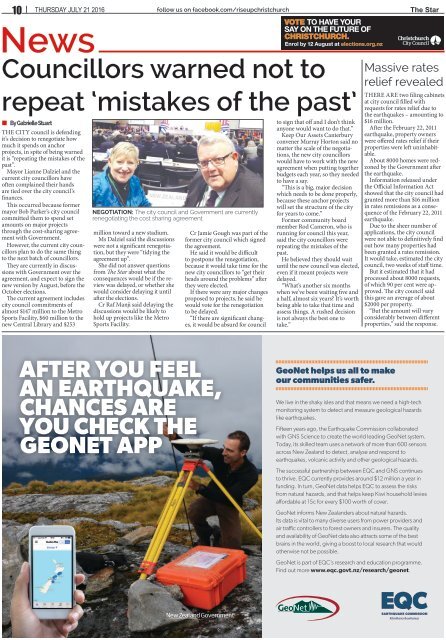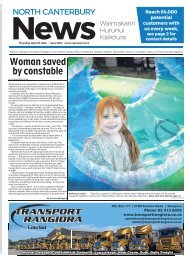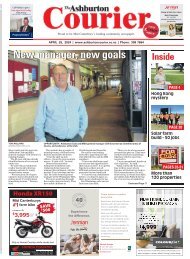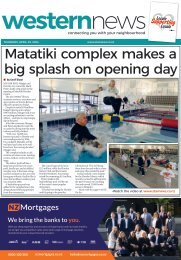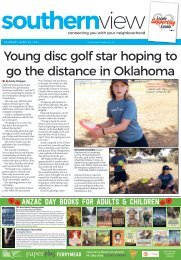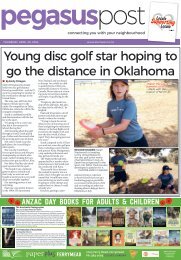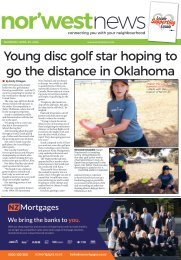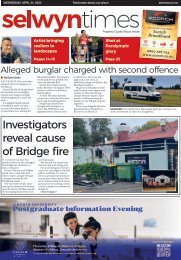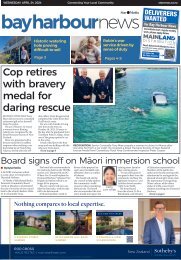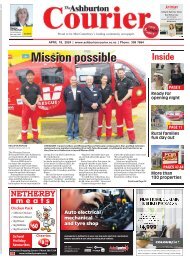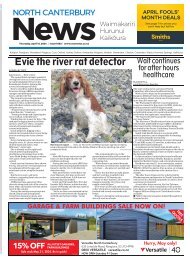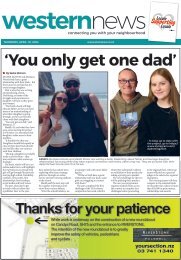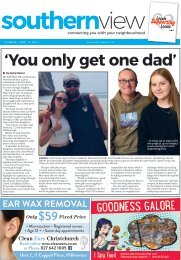The Star: July 21, 2016
You also want an ePaper? Increase the reach of your titles
YUMPU automatically turns print PDFs into web optimized ePapers that Google loves.
10 Thursday <strong>July</strong> <strong>21</strong> <strong>2016</strong><br />
follow us on facebook.com/riseupchristchurch<br />
ews<br />
Councillors warned not to<br />
repeat ‘mistakes of the past’<br />
THERE<br />
• By Gabrielle Stuart<br />
THE CITY council is defending<br />
it’s decision to renegotiate how<br />
much it spends on anchor<br />
projects, in spite of being warned<br />
it is “repeating the mistakes of the<br />
past”.<br />
Mayor Lianne Dalziel and the<br />
current city councillors have<br />
often complained their hands<br />
are tied over the city council’s<br />
finances.<br />
This occurred because former<br />
mayor Bob Parker’s city council<br />
committed them to spend set<br />
amounts on major projects<br />
through the cost-sharing agreement<br />
with Government.<br />
However, the current city councillors<br />
plan to do the same thing<br />
to the next batch of councillors.<br />
<strong>The</strong>y are currently in discussions<br />
with Government over the<br />
agreement, and expect to sign the<br />
new version by August, before the<br />
October elections.<br />
<strong>The</strong> current agreement includes<br />
city council commitments of<br />
almost $147 million to the Metro<br />
Sports Facility, $60 million to the<br />
new Central Library and $253<br />
NEGOTIATION: <strong>The</strong> city council and Government are currently<br />
renegotiating the cost sharing agreement. <br />
million toward a new stadium.<br />
Ms Dalziel said the discussions<br />
were not a significant renegotiation,<br />
but they were “tidying the<br />
agreement up”.<br />
She did not answer questions<br />
from <strong>The</strong> <strong>Star</strong> about what the<br />
consequences would be if the review<br />
was delayed, or whether she<br />
would consider delaying it until<br />
after the elections.<br />
Cr Raf Manji said delaying the<br />
discussions would be likely to<br />
hold up projects like the Metro<br />
Sports Facility.<br />
Cr Jamie Gough was part of the<br />
former city council which signed<br />
the agreement.<br />
He said it would be difficult<br />
to postpone the renegotiation,<br />
because it would take time for the<br />
new city councillors to “get their<br />
heads around the problems” after<br />
they were elected.<br />
If there were any major changes<br />
proposed to projects, he said he<br />
would vote for the renegotiation<br />
to be delayed.<br />
“If there are significant changes,<br />
it would be absurd for council<br />
VOTE TO HAVE YOUR<br />
SAY ON THE FUTURE OF<br />
CHRISTCHURCH.<br />
Enrol by 12 August at elections.org.nz<br />
to sign that off and I don’t think<br />
anyone would want to do that.”<br />
Keep Our Assets Canterbury<br />
convener Murray Horton said no<br />
matter the scale of the negotiations,<br />
the new city councillors<br />
would have to work with the new<br />
agreement when putting together<br />
budgets each year, so they needed<br />
to have a say.<br />
“This is a big, major decision<br />
which needs to be done properly,<br />
because these anchor projects<br />
will set the structure of the city<br />
for years to come.”<br />
Former community board<br />
member Rod Cameron, who is<br />
running for council this year,<br />
said the city councillors were<br />
repeating the mistakes of the<br />
past.<br />
He believed they should wait<br />
until the new council was elected,<br />
even if it meant projects were<br />
delayed.<br />
“What’s another six months<br />
when we’ve been waiting five and<br />
a half, almost six years? It’s worth<br />
being able to take that time and<br />
assess things. A rushed decision<br />
is not always the best one to<br />
take.”<br />
<strong>The</strong> <strong>Star</strong><br />
Massive rates<br />
relief revealed<br />
ARE two filing cabinets<br />
at city council filled with<br />
requests for rates relief due to<br />
the earthquakes – amounting to<br />
$16 million.<br />
After the February 22, 2011<br />
earthquake, property owners<br />
were offered rates relief if their<br />
properties were left uninhabitable.<br />
About 8000 homes were redzoned<br />
by the Government after<br />
the earthquake.<br />
Information released under<br />
the Official Information Act<br />
showed that the city council had<br />
granted more than $16 million<br />
in rates remissions as a consequence<br />
of the February 22, 2011<br />
earthquake.<br />
Due to the sheer number of<br />
applications, the city council<br />
were not able to definitively find<br />
out how many properties had<br />
been granted a rates remission.<br />
It would take, estimated the city<br />
council, two weeks of staff time.<br />
But it estimated that it had<br />
processed about 8000 requests,<br />
of which 90 per cent were approved.<br />
<strong>The</strong> city council said<br />
this gave an average of about<br />
$2000 per property.<br />
“But the amount will vary<br />
considerably between different<br />
properties,” said the response.<br />
AFTER YOU FEEL<br />
AN EARTHQUAKE,<br />
CHANCES ARE<br />
YOU CHECK THE<br />
GEONET APP<br />
GeoNet helps us all to make<br />
our communities safer.<br />
We live in the shaky isles and that means we need a high-tech<br />
monitoring system to detect and measure geological hazards<br />
like earthquakes.<br />
Fifteen years ago, the Earthquake Commission collaborated<br />
with GNS Science to create the world leading GeoNet system.<br />
Today, its skilled team uses a network of more than 600 sensors<br />
across New Zealand to detect, analyse and respond to<br />
earthquakes, volcanic activity and other geological hazards.<br />
<strong>The</strong> successful partnership between EQC and GNS continues<br />
to thrive. EQC currently provides around $12 million a year in<br />
funding. In turn, GeoNet data helps EQC to assess the risks<br />
from natural hazards, and that helps keep Kiwi household levies<br />
affordable at 15c for every $100 worth of cover.<br />
GeoNet informs New Zealanders about natural hazards.<br />
Its data is vital to many diverse users from power providers and<br />
air traffic controllers to forest owners and insurers. <strong>The</strong> quality<br />
and availability of GeoNet data also attracts some of the best<br />
brains in the world, giving a boost to local research that would<br />
otherwise not be possible.<br />
GeoNet is part of EQC’s research and education programme.<br />
Find out more www.eqc.govt.nz/research/geonet.


